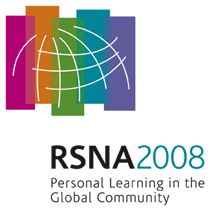
Abstract Archives of the RSNA, 2008
LL-PD4116-R10
Remotely Controlled MRI Scanning of Children with Complex Cardiovascular Disease: Clinical Experience
Scientific Posters
Presented on December 4, 2008
Presented as part of LL-PD-R: Pediatric
Reza Habibi MD, Presenter: Nothing to Disclose
M. Ines Boechat MD, FACR, Abstract Co-Author: Nothing to Disclose
Roya S. Saleh MD, Abstract Co-Author: Nothing to Disclose
Derek Gerard Lohan MBBCh, Abstract Co-Author: Nothing to Disclose
Ihab Adel Ayad MD, Abstract Co-Author: Nothing to Disclose
J. Paul Finn MD, Abstract Co-Author: Research Consultant, Siemens AG
Speakers Bureau, Bayer AG
MR imaging in children with complex congenital heart disease is among the most challenging procedures performed with MRI. In this study we evaluated the impact of providing specialist technical assistance by remote control in pediatric patients with cardiac and vascular disorders.
A total of 46 patients [26 male and 20 female patients; mean age 32 months (5 days to13 years of age)] underwent remotely operated cardiac MRI and/or contrast-enhanced MR angiography of the chest and abdomen on a 1.5 T scanner (Sonata, Siemens Medical Solutions), under general anesthesia and controlled apnea as appropriate. Multiplanar cardiac SSFP cine sequences were performed routinely, as well as high spatial resolution contrast enhanced MR angiography (CEMRA) of the thorax and abdomen. All scans were performed remotely by an experienced operator via a personal computer located 0.5 miles from the MRI scanner. Hands-free audio communication was established between the remote operator (RO) and local technologist (LT) via telephone. The RO had full control of the scanning console, while the LT controlled all aspects of patient positioning and safety monitoring, as well as maintaining communication between the radiologist (RO) and anesthesiologist. The resulting images were evaluated by two radiologists in consensus for overall quality of cardiac cine images and visibility of arterial segments on CEMRA based on a four-point scale grading system (0 to 3; 2 and 3 considered as diagnostic). Presence of artifacts (motion, susceptibility, etc.) was documented.
All the 96 cardiac series acquired in the total of 24 cardiac cases (four planes each) were diagnostic (mean score of 2.72 ± 0.49; CI=0.01). Susceptibility and off-resonance artifacts were present in a minority of cases with minimal or no effect on diagnosis. Out of 1040 arterial segments, 1008 segments were rated as diagnostic (mean score of 2.8 ± 0.48; CI=0.03).
Technical success in MRI scanning of children with complex congenital heart disease can be achieved with remote control assistance from a specialist operator.
Successful MRI scanning of children with complex congenital heart disease can be performed without on-site specialist expertise by using remote control online assistance.
Habibi, R,
Boechat, M,
Saleh, R,
Lohan, D,
Ayad, I,
Finn, J,
Remotely Controlled MRI Scanning of Children with Complex Cardiovascular Disease: Clinical Experience. Radiological Society of North America 2008 Scientific Assembly and Annual Meeting, February 18 - February 20, 2008 ,Chicago IL.
http://archive.rsna.org/2008/6019190.html

